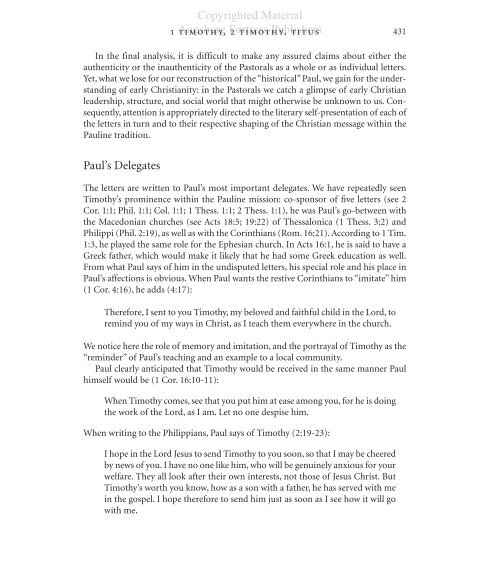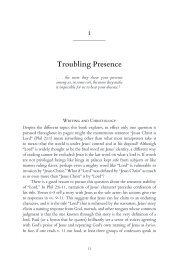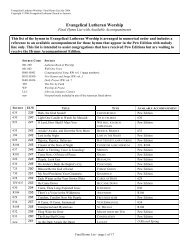19. Pastoral Letters: 1 Timothy, 2 Timothy, Titus - Augsburg Fortress
19. Pastoral Letters: 1 Timothy, 2 Timothy, Titus - Augsburg Fortress
19. Pastoral Letters: 1 Timothy, 2 Timothy, Titus - Augsburg Fortress
Create successful ePaper yourself
Turn your PDF publications into a flip-book with our unique Google optimized e-Paper software.
Copyrighted Material<br />
1 <strong>Augsburg</strong> timothy, <strong>Fortress</strong> 2 timothy, Publishers titus 431<br />
In the final analysis, it is difficult to make any assured claims about either the<br />
authenticity or the inauthenticity of the <strong>Pastoral</strong>s as a whole or as individual letters.<br />
Yet, what we lose for our reconstruction of the “historical” Paul, we gain for the understanding<br />
of early Christianity: in the <strong>Pastoral</strong>s we catch a glimpse of early Christian<br />
leadership, structure, and social world that might otherwise be unknown to us. Consequently,<br />
attention is appropriately directed to the literary self-presentation of each of<br />
the letters in turn and to their respective shaping of the Christian message within the<br />
Pauline tradition.<br />
Paul’s Delegates<br />
The letters are written to Paul’s most important delegates. We have repeatedly seen<br />
<strong>Timothy</strong>’s prominence within the Pauline mission: co-sponsor of five letters (see 2<br />
Cor. 1:1; Phil. 1:1; Col. 1:1; 1 Thess. 1:1; 2 Thess. 1:1), he was Paul’s go-between with<br />
the Macedonian churches (see Acts 18:5; 19:22) of Thessalonica (1 Thess. 3:2) and<br />
Philippi (Phil. 2:19), as well as with the Corinthians (Rom. 16:21). According to 1 Tim.<br />
1:3, he played the same role for the Ephesian church. In Acts 16:1, he is said to have a<br />
Greek father, which would make it likely that he had some Greek education as well.<br />
From what Paul says of him in the undisputed letters, his special role and his place in<br />
Paul’s affections is obvious. When Paul wants the restive Corinthians to “imitate” him<br />
(1 Cor. 4:16), he adds (4:17):<br />
Therefore, I sent to you <strong>Timothy</strong>, my beloved and faithful child in the Lord, to<br />
remind you of my ways in Christ, as I teach them everywhere in the church.<br />
We notice here the role of memory and imitation, and the portrayal of <strong>Timothy</strong> as the<br />
“reminder” of Paul’s teaching and an example to a local community.<br />
Paul clearly anticipated that <strong>Timothy</strong> would be received in the same manner Paul<br />
himself would be (1 Cor. 16:10-11):<br />
When <strong>Timothy</strong> comes, see that you put him at ease among you, for he is doing<br />
the work of the Lord, as I am. Let no one despise him.<br />
When writing to the Philippians, Paul says of <strong>Timothy</strong> (2:19-23):<br />
I hope in the Lord Jesus to send <strong>Timothy</strong> to you soon, so that I may be cheered<br />
by news of you. I have no one like him, who will be genuinely anxious for your<br />
welfare. They all look after their own interests, not those of Jesus Christ. But<br />
<strong>Timothy</strong>’s worth you know, how as a son with a father, he has served with me<br />
in the gospel. I hope therefore to send him just as soon as I see how it will go<br />
with me.




